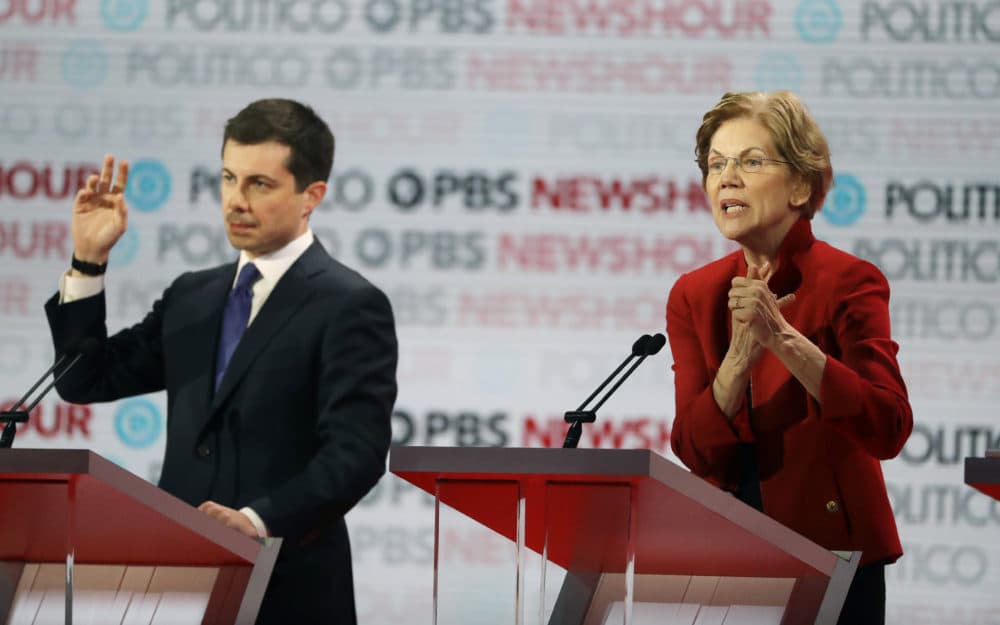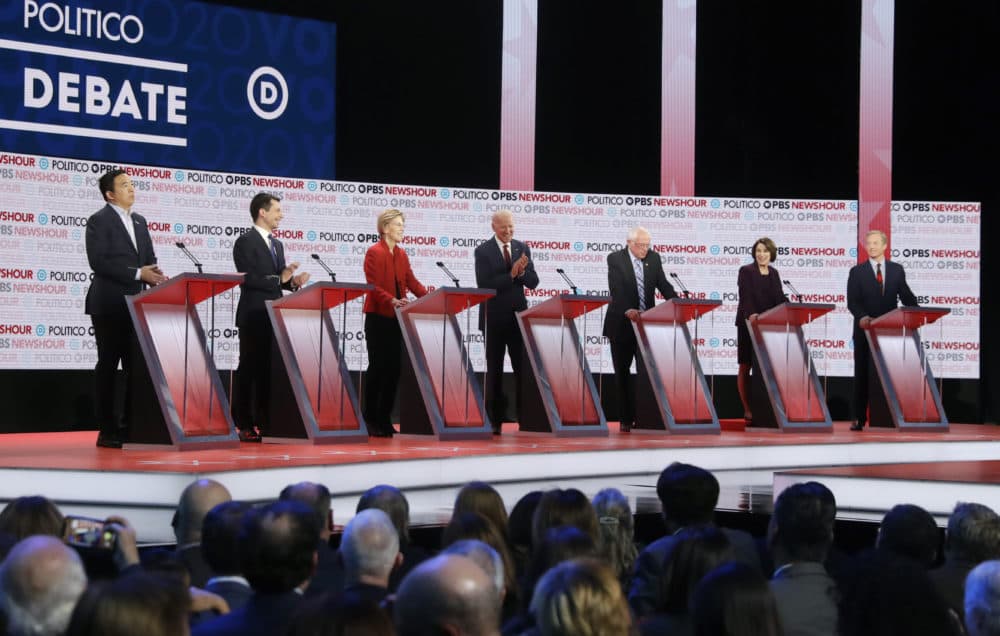Advertisement
Commentary
Why The Gloves Came Off When They Started Talking About Wine Caves

This is happening, and the Democrats are finally acting like it.
Seven weeks before the Iowa caucuses, eight weeks before New Hampshire primary, the sixth Democratic primary debate on Thursday night had an elevated sense of urgency. Frontrunners had to be challenged. (Pete Buttigieg, leading in the most recent Iowa polls, faced multipronged attacks from his irritated elders.) Stump speeches had to be delivered. (Elizabeth Warren does not stop for timers when talking about the meaning of her selfies.) And Amy Klobuchar, badly trailing the frontrunners in the polls, made a last-ditch effort to elevate her candidacy — and might have succeeded.
It helped that, thanks to more stringent qualification rules, the candidate count was down to a manageable seven. But it also helped that the candidates understand this stage of the campaign. Yes, the debate touched on immigration, climate change, China, and health care (though the standard Medicare-for-all-or-just-for-all-who-want-it interlude was blessedly brief this time).

But on the issues, the daylight between these candidates is relatively slender: shades of difference in their taxation methods and their relative zeal to squeeze money out of billionaires. The real battleground is electability, personality, and image — who will spark the voter turnout and enthusiasm, who can compete, energy-wise, with a guy who tweets incendiary comments at all hours.
That’s why things picked up when they started talking about the wine cave.
This was Warren’s line of attack on Buttigieg, a proxy for a longstanding philosophical question: Do Democrats need fiery progressive to draw in new voters, or should they stick with a relative moderate who can win over on-the-fence Trump voters? Warren, representing Team Progressive, pointed out that Buttigieg recently held a closed-door fundraiser in a winery, where well-heeled donors drank samples from $900 wines. “Billionaires in wine caves,” she declared, “should not pick the next president of the United States.”
Buttigieg was ready — he’s such a slick talker, he always seems ready — with some lines about how every donor was welcome, and he couldn’t be bought so easily, and before a recent change of heart, Warren had once raised money the same way. “This is the problem with issuing purity tests you cannot yourself pass,” he said. It sounded good, but the image stuck; Andrew Yang made a joke about wine caves later in the night. Within hours, Bernie Sanders’ campaign had claimed the URL peteswinecave.com and diverted it to a Sanders donation page.
Advertisement
But Warren’s attack was nothing compared to Klobuchar’s. To her, Buttigieg is an existential threat, the other Midwestern moderate, the guy standing in her lane. Also, you get the sense that she doesn’t like him much. Maybe the feeling is mutual; their one-on-ones got a little schoolyard-y. Here’s a paraphrase, consolidated:
Buttigieg: I didn’t come up with my plans in committee hearings.
Klobuchar: You just mocked some of us on this stage, who have done excellent work in committee hearings.
Buttigieg: Well, you mocked me when I said I support a free press. May I remind you that I’m a veteran?
Klobuchar: At least I’ve been elected to something bigger than a city.
Buttigieg: You might think my city is small, but I got 80 percent of the vote as — he actually said this — “a gay dude in Mike Pence’s Indiana.”
Klobuchar: Yeah, but that time you ran for office, you lost by 20 points.
This is happening, and the Democrats are finally acting like it.
It might not have been a knockout punch, but Klobuchar made her presence known, and seemed more confident than she had on the debate stage in the past. Biden, too, seemed more comfortable than in past debates, with ready answers on the issues and no noticeable gaffes (though his impression of a stuttering child, coming to him for empathy on the campaign trail, sparked an ugly sideshow on Twitter.). Sanders is beyond proving that he has energy post-heart attack; in truth, he had more energy than Buttigieg and Tom Steyer put together.
A brief update on Steyer: He is still wearing the plaid necktie. He cares about climate change. He attempted to take credit for impeachment. The other candidates waited politely when he spoke, then essentially ignored him.
A longer point on Andrew Yang: He’s probably not going to be president, but as long as he can eke his way into these debates, he serves a valuable purpose as a speaker of truth. He was the one who stated aloud that the Democrats’ true problem isn’t Trump, but the circumstances that created Trump’s rise. Last night, he said the biggest threat we face from China might well be the country’s attempted ascendancy in AI. He also emitted this line, while talking about the need for more women in public office: “If you get too many men alone and leave us alone for a while, we kind of become morons.”
That could be. But at this point, barring somebody’s unforeseen surge in the polls, the race is down to only two women and five men. And Warren made sure everyone remembered the imbalance. When a moderator noted that, if she won, she would be the oldest president ever inaugurated, she shot back: “I’d also be the youngest woman ever inaugurated.”
She got huge applause for that. And in some wine cave somewhere, perhaps a woman popped a cork in deep approval.
